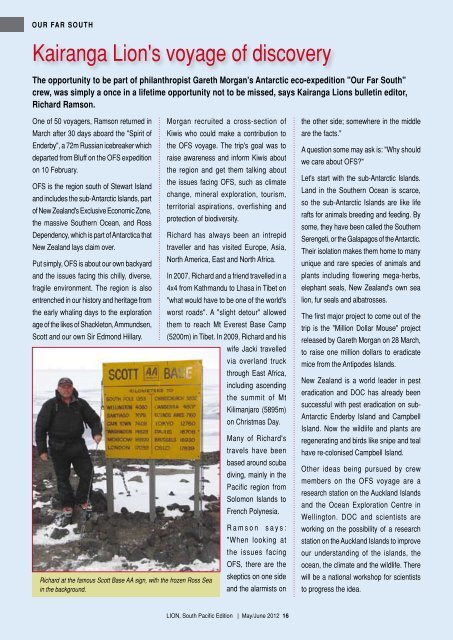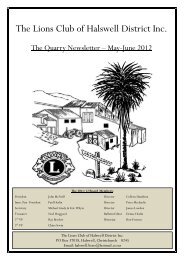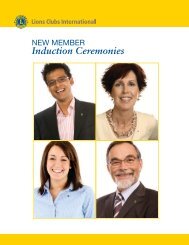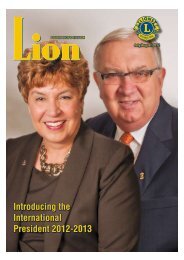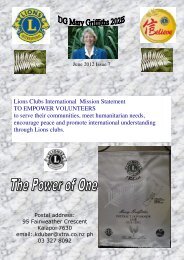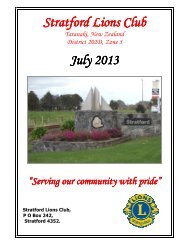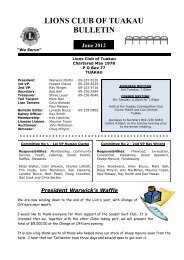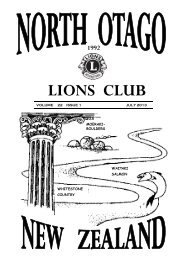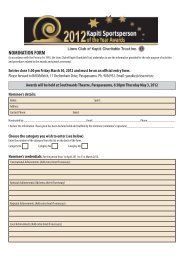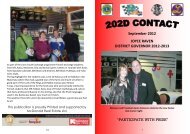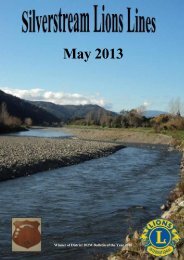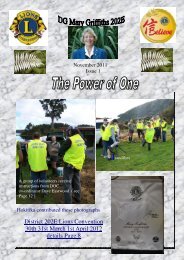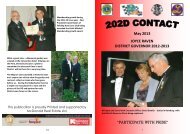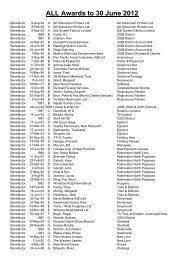Leos leap into service Convention highlights - Lions Clubs New ...
Leos leap into service Convention highlights - Lions Clubs New ...
Leos leap into service Convention highlights - Lions Clubs New ...
- No tags were found...
You also want an ePaper? Increase the reach of your titles
YUMPU automatically turns print PDFs into web optimized ePapers that Google loves.
OUR FAR SOUTHKairanga Lion's voyage of discoveryThe opportunity to be part of philanthropist Gareth Morgan's Antarctic eco-expedition "Our Far South"crew, was simply a once in a lifetime opportunity not to be missed, says Kairanga <strong>Lions</strong> bulletin editor,Richard Ramson.One of 50 voyagers, Ramson returned inMarch after 30 days aboard the "Spirit ofEnderby", a 72m Russian icebreaker whichdeparted from Bluff on the OFS expeditionon 10 February.OFS is the region south of Stewart Islandand includes the sub-Antarctic Islands, partof <strong>New</strong> Zealand's Exclusive Economic Zone,the massive Southern Ocean, and RossDependency, which is part of Antarctica that<strong>New</strong> Zealand lays claim over.Put simply, OFS is about our own backyardand the issues facing this chilly, diverse,fragile environment. The region is alsoentrenched in our history and heritage fromthe early whaling days to the explorationage of the likes of Shackleton, Ammundsen,Scott and our own Sir Edmond Hillary.Morgan recruited a cross-section ofKiwis who could make a contribution tothe OFS voyage. The trip's goal was toraise awareness and inform Kiwis aboutthe region and get them talking aboutthe issues facing OFS, such as climatechange, mineral exploration, tourism,territorial aspirations, overfishing andprotection of biodiversity.Richard has always been an intrepidtraveller and has visited Europe, Asia,North America, East and North Africa.In 2007, Richard and a friend travelled in a4x4 from Kathmandu to Lhasa in Tibet on"what would have to be one of the world'sworst roads". A "slight detour" allowedthem to reach Mt Everest Base Camp(5200m) in Tibet. In 2009, Richard and hiswife Jacki travelledvia overland truckthrough East Africa,including ascendingthe summit of MtKilimanjaro (5895m)on Christmas Day.Many of Richard'stravels have beenbased around scubadiving, mainly in thePacific region fromSolomon Islands toFrench Polynesia.Ramson says:"When looking atthe issues facingOFS, there are theskeptics on one sideand the alarmists onthe other side; somewhere in the middleare the facts."A question some may ask is: "Why shouldwe care about OFS?"Let's start with the sub-Antarctic Islands.Land in the Southern Ocean is scarce,so the sub-Antarctic Islands are like liferafts for animals breeding and feeding. Bysome, they have been called the SouthernSerengeti, or the Galapagos of the Antarctic.Their isolation makes them home to manyunique and rare species of animals andplants including flowering mega-herbs,elephant seals, <strong>New</strong> Zealand's own sealion, fur seals and albatrosses.The first major project to come out of thetrip is the "Million Dollar Mouse" projectreleased by Gareth Morgan on 28 March,to raise one million dollars to eradicatemice from the Antipodes Islands.<strong>New</strong> Zealand is a world leader in pesteradication and DOC has already beensuccessful with pest eradication on sub-Antarctic Enderby Island and CampbellIsland. Now the wildlife and plants areregenerating and birds like snipe and tealhave re-colonised Campbell Island.Other ideas being pursued by crewmembers on the OFS voyage are aresearch station on the Auckland Islandsand the Ocean Exploration Centre inWellington. DOC and scientists areworking on the possibility of a researchstation on the Auckland Islands to improveour understanding of the islands, theocean, the climate and the wildlife. Therewill be a national workshop for scientiststo progress the idea.LION, South Pacific Edition | May/June 2012 16


